Book contents
- Frontmatter
- Contents
- Figures
- Acknowledgments
- Introduction
- 1. Childhood
- 2. Florence and Cosimo the Elder
- 3. The Cultural Climate of Florence
- 4. First Years in Florence and the Verrocchio Workshop
- 5. First Works in Florence and the Artistic Milieu
- 6. Early Pursuits in Engineering ??? Hydraulics and the Movement of Water
- 7. The Bust of a Warrior and Leonardo's Creative Method
- 8. Early Participation in the Medici Court
- 9. Leonardo's Personality and Place in Florentine Society
- 10. Important Productions and Collaborations in the Verrocchio Shop
- 11. Leonardo's Colleagues in the Workshop
- 12. Leonardo's Madonna of the Carnation and the Exploration of Optics
- 13. The Benois Madonna and Continued Meditations on the Theme of Sight
- 14. The Madonna of the Cat
- 15. Leonardo, the Medici, and Public Executions
- 16. Leonardo and Ginevra de??? Benci
- 17. Leonardo as Portraitist and Master of the Visual Pun
- 18. The Young Sculptor
- 19. The Madonna Litta
- 20. The Adoration of the Magi and Invention of the High Renaissance Style
- 21. The Adoration and Leonardo's Military Interests
- 22. Leonardo and Allegorical Conceits for the Medici Court
- 23. Early Ideas for the Last Supper
- 24. Leonardo and the Saint Sebastian
- 25. Saint Jerome
- 26. First Thoughts for the Virgin of the Rocks and the Invention of the Mary Magdalene-Courtesan Genre
- 27. Milan
- 28. Leonardo and the Sforza Court
- Bibliography with Endnotes
- Index
9. - Leonardo's Personality and Place in Florentine Society
Published online by Cambridge University Press: 07 September 2011
- Frontmatter
- Contents
- Figures
- Acknowledgments
- Introduction
- 1. Childhood
- 2. Florence and Cosimo the Elder
- 3. The Cultural Climate of Florence
- 4. First Years in Florence and the Verrocchio Workshop
- 5. First Works in Florence and the Artistic Milieu
- 6. Early Pursuits in Engineering ??? Hydraulics and the Movement of Water
- 7. The Bust of a Warrior and Leonardo's Creative Method
- 8. Early Participation in the Medici Court
- 9. Leonardo's Personality and Place in Florentine Society
- 10. Important Productions and Collaborations in the Verrocchio Shop
- 11. Leonardo's Colleagues in the Workshop
- 12. Leonardo's Madonna of the Carnation and the Exploration of Optics
- 13. The Benois Madonna and Continued Meditations on the Theme of Sight
- 14. The Madonna of the Cat
- 15. Leonardo, the Medici, and Public Executions
- 16. Leonardo and Ginevra de??? Benci
- 17. Leonardo as Portraitist and Master of the Visual Pun
- 18. The Young Sculptor
- 19. The Madonna Litta
- 20. The Adoration of the Magi and Invention of the High Renaissance Style
- 21. The Adoration and Leonardo's Military Interests
- 22. Leonardo and Allegorical Conceits for the Medici Court
- 23. Early Ideas for the Last Supper
- 24. Leonardo and the Saint Sebastian
- 25. Saint Jerome
- 26. First Thoughts for the Virgin of the Rocks and the Invention of the Mary Magdalene-Courtesan Genre
- 27. Milan
- 28. Leonardo and the Sforza Court
- Bibliography with Endnotes
- Index
Summary
Leonardo's musings about romance, and about human qualities, behavior, and failings, appear to have led to his unusual drawing of Phyllis Astride Aristotle (c. 1475–78), a scene of such awkward folly that it anticipates the antiheroics of Shakespeare and Rembrandt (fig. 17). The specific impetus for the study was probably either a contemporary Florentine engraving or one of many circulating Northern European prints of the subject. According to legend, the ancient Greek philosopher Aristotle, of steely mind but evidently weak knees, allowed his beautiful young mistress, Phyllis, to ride on his back in exchange for her favors.
In a cramped sketch of ungainly postures and forced perspective (the furniture recedes too rapidly in space), Leonardo gently pokes fun at his supreme intellectual mentor, who, on all fours, looks back imploringly and shamefully at his dominatrix, in the general direction of the bed that awaits them. For the good-humored Leonardo the contrast between the realms of the intellect and the flesh made for fine parody – a telling counterpoint to Michelangelo's self-flaying paintings and poems devoted to related themes of base carnality. Leonardo's bemused attitude toward heterosexual conduct is apparent in a remark he later jotted in one of his notebooks: “the act of procreation and everything that has any relation to it is so disgusting that human beings would soon die out if there were no pretty faces and sensuous dispositions.”
- Type
- Chapter
- Information
- The Young LeonardoArt and Life in Fifteenth-Century Florence, pp. 59 - 66Publisher: Cambridge University PressPrint publication year: 2011



